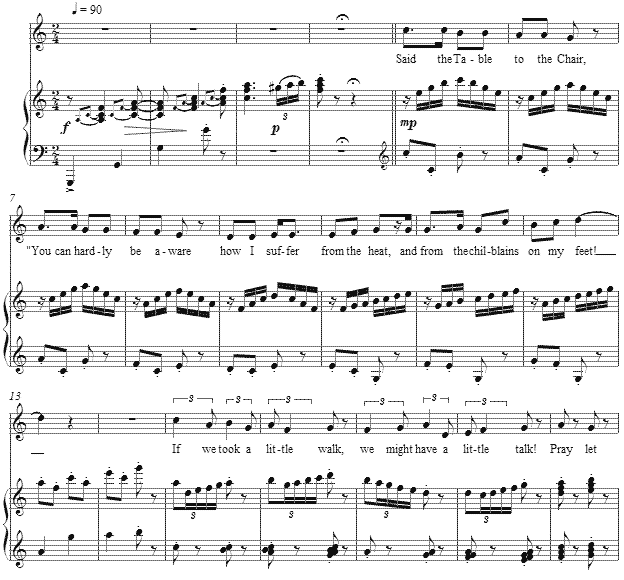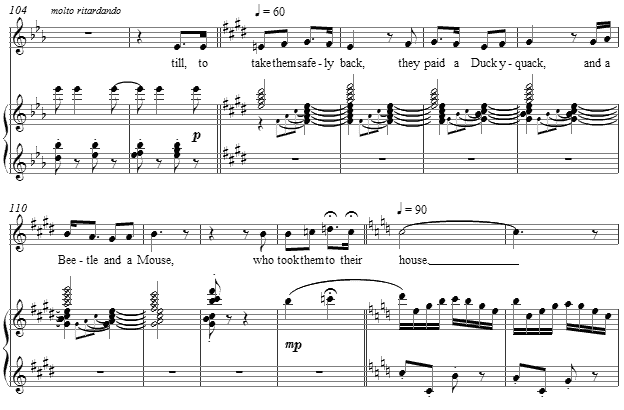Music and Texts of GARY BACHLUND
Vocal Music | Piano | Organ | Chamber Music | Orchestral | Articles and Commentary | Poems and Stories | Miscellany | FAQs
The Table and the Chair - (2010)
Edward Lear
for medium voice and piano
I.
Said the Table to the Chair,
"You can hardly be aware,
"How I suffer from the heat,
"And from chilblains on my feet!
"If we took a little walk,
"We might have a little talk!
"Pray let us take the air!"
Said the Table to the Chair.
II .
Said the Chair to the table,
"Now you know we are not able!
"How foolishly you talk,
"When you know we cannot walk!"
Said the Table with a sigh,
"It can do no harm to try,
"I've as many legs as you,
'Why can't we walk on two?"
III.
So they both went slowly down,
And walked about the town
With a cheerful bumpy sound,
As they toddled round and round.
And everybody cried,
As they hastened to the side,
"See! the Table and the Chair
"Have come out to take the air!"
IV.
But in going down an alley,
To a castle in a valley,
They completely lost their way,
And wandered all the day,
Till, to see them safely back,
They paid a Ducky-quack,
And a Beetle, and a Mouse,
Who took them to their house.
V.
Then they whispered to each other,
"O delightful little brother!
"What a lovely walk we've taken!
"Let us dine on Beans and Bacon!"
So the Ducky and the leetle
Browny-Mousy and the Beetle
Dined and danced upon their heads
Till they toddled to their beds.[ 6 pages, circa 3' 40" ]
Edward Lear in his own caricature
George Orwell instructs us that, "Humour is the debunking of humanity, and nothing is funny except in relation to human beings. Animals, for instance, are only funny because they are caricatures of ourselves. A lump of stone could not of itself be funny; but it can become funny if it hits a human being in the eye, or if it is carved into human likeness. However, there are subtler methods of debunking than throwing custard pies. There is also the humour of pure fantasy, which assaults man's notion of himself as not only a dignified but a rational being. Lewis Carroll's humour consists essentially in making fun of logic, and Edward Lear's in a sort of poltergeist interference with common sense." Leader, 28 July 1945.
The illustrations which Lear provided for this poem see inanimate objects and animals acting as people, the grammar correct per the observation of Orwell but the reality pleasantly wrong. The instances of impossibilities being presented in the world of men is no more nonsense than this nonsense, and of course no less.
The verses begin in C major, slip to D flat, then D and eventually to E to ease the return to the tonic. Yet the periodicity of the verses and their settings alter each time, for this is no standard verse setting.
At the moment the table and chair become lost, the accompaniment awkwardly tries to find its way with quick quotes from other tonalities alongside E flat major. They are of course found in E major and assisted in their return to the tonic major.
The score for The Table and the Chair is available as a free PDF download, though any major commercial performance or recording of the work is prohibited without prior arrangement with the composer. Click on the graphic below for this piano-vocal score.


